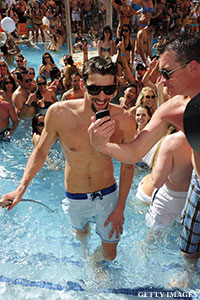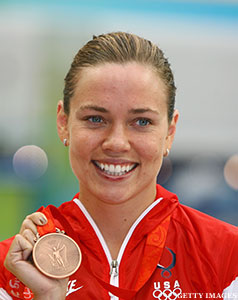
The Olympic gods have spoken, and they have told athletes participating in Games of the XXX Olympiad next year in London that they are what they tweet.
In its guidelines for social media, namely Twitter, the International Olympic Committee says athletes must accept a handful of conditions that could carry the severest of penalties if broken -- removal from the Games. If someone does not comply with these rules, they could find themselves outside the Olympic Village looking in. Touting a product is among the no-no's.
Olympians will have the freedom to tweet, much as they did for the 2010 Winter Games in Vancouver, but they will be held personally responsible for what is posted on their individual Twitter accounts from July 27–Aug. 12, 2012.
According to the London Games' official Social Media, Blogging and Internet Guidelines, the IOC "actively encourages and supports" social media postings so long as they respect the Olympic Charter. This means messages should uphold the Olympic spirit and "be dignified and in good taste, and not contain vulgar or obscene words or images."
A posting will also be deemed acceptable "as long as it is not for commercial and/or advertising purposes." The IOC does not want athletes performing the role of journalists, reporting or commenting on competitions, other participants or broadcast private information of any other person or organization, so it has suggested posts "should be in a first-person, diary-type format."
The Twitterverse was relatively quiet over the news with most interested users content just to repost stories on the subject. On Monday, both 11-time swimming Olympic medalist Natalie Coughlin and Michael Phelps' coach Bob Bowman retweeted a Reuters story. American swimming hopeful Nick Brunelli, an alum of Arizona State, simply tweeted, "Interesting" to go along with the same link.
While standard written messages will be perfectly acceptable, in an effort to protect the large amount of revenue produced by the IOC's broadcast contracts, audio and video from within Olympic venues (i.e. events, competitions, opening/closing ceremonies) is strictly forbidden from being shared by participants. Earlier in June, NBC announced a deal to extend its exclusive broadcast rights through the 2020 Games for more than $4 billion.

The sharing of photographs will be allowed, but any picture including more than the person who possesses the account must have prior approval of others in the photo.
Disregarding any of these rules, per the IOC's sole discretion, may result in sanctions including a "Take Down Notice," legal action for damages, and the biggie, having accreditation stripped of any organization or participant. No word on if that means someone could have a medal taken away, but that last clause does mean violators could be permanently expelled.
To enforce this policy, the IOC has established both a group to monitor athletes' social media accounts, as well as website for people to narc on those not in compliance.
Having this clearly defined set of expectations should help athletes, considering there was notable confusion over social media at the last Olympics in Vancouver. At one point because of conflicting information, American skier Lindsey Vonn incorrectly believed that the duration of competition constituted as a blackout period and she was unable to use social media during that time.
In addition, while it has been more of a complicated issue for at least two of the big four major American professional leagues, the IOC appears to have embraced social media.
Since the first tweet heard 'round the world, Charlie Villanueva's halftime post in March 2009 while he was a member of the Milwaukee Bucks, Shaquille O'Neal did the same a week later while with the Phoenix Suns, and the NBA was forced to release a Twitter policy that September. Several players, notably Milwaukee's Brandon Jennings and most recently the Magic's Gilbert Arenas have been fined for tweeting.
The NFL has also had several issues arise from players tweeting. In August 2009, cornerback Antonio Cromartie -- then with the San Diego Chargers -- was fined $2,500 for posting that the "nasty food" players were being served contributed to their poor performance. In 2010, Bengals receivers Chad Ochocinco and Terrell Owens were fined in separate incidents relating to the time in which they posted.
The No Fun League was the first to issue a Twitter policy and has the strictest rules, not allowing the use of social media 90 minutes before the start of a game and not until post-game responsibilities have been completed.
The NBA prohibits social media usage 45 minutes before a game and also not until post-game responsibilities have been fulfilled. The NHL and Major League Baseball set their limits at 30 minutes before games. The NHL also enforces these restrictions to after games, practices, meetings and all media access periods.




